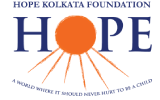
Hope Kolkata Foundation
A World Where It Should Never Hurt To Be A Child
HOPE aspires to make education accessible to all children and young adults from vulnerable and underserved communities.
HOPE believes that quality education paves sustainable pathways for all community members.
HOPE’s Education and Sponsorship projects also align with the NEP 2020, the Right of Children to Free and Compulsory Education Act, 2009, and the UN Sustainable Development Goals.

Overview
The School Education project focuses on making education easy and accessible through joyful learning techniques. Engaging teaching-learning material, an accessible classroom ensures the educational needs of all children.
The resource centres under this project are dedicated exclusively to children with special needs. Identifying and addressing learning gaps, development delays are the mainstays of the project.
School enrollment and retention of children in formal school are central to the aims of this project.
Currently, 43 government schools and 17 resource centres are supported under this project.
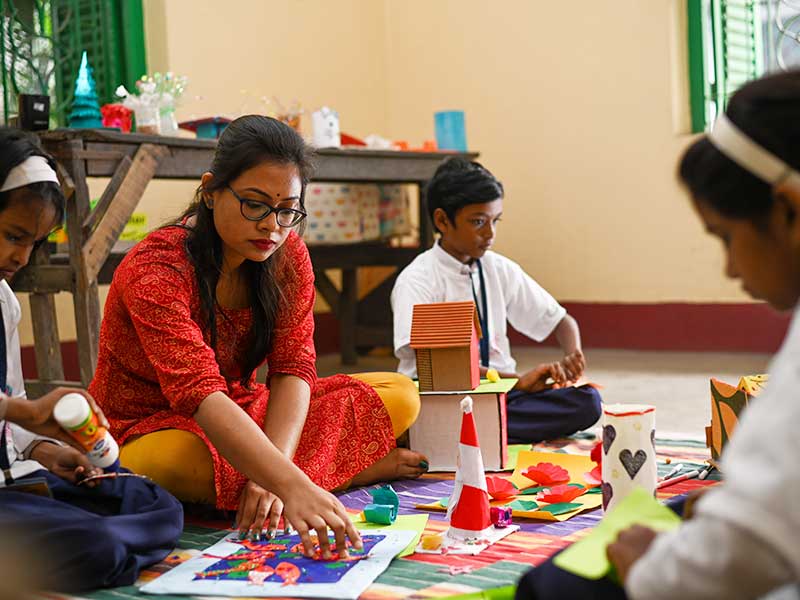
Story of Change
Roshan belongs to an economically vulnerable family. His father works as a driver and is the sole earning member of the family. Roshan is a first-generation learner of his family. Without any support or encouragement from home, Roshan struggled to keep up with school. Even though he was enrolled in school, Roshan had a significant learning gap.
Hope Kolkata Foundation teachers soon intervened in the school and conducted an ASER test to determine Roshan’s learning level. The test revealed that Roshan could not identify letters or numbers. To help Roshan overcome the learning gap, the teachers developed an individual plan.
The child was also guided to regularly practise a specially designed workbook named “Amar Bondhu”. Different child friendly, attractive teaching learning helped to interest Roshan in classroom activities. Gradually, the child found interest in attending school.
After 1 year of continuous support, Roshan has shown remarkable progress in his academics. He is now in class V. The child who was once unable to identify letters and numbers can now read Bengali and English stories with fluency. Roshan can also solve simple mathematical problems with ease. He has now achieved the basic proficiency level as per the ASER tool.
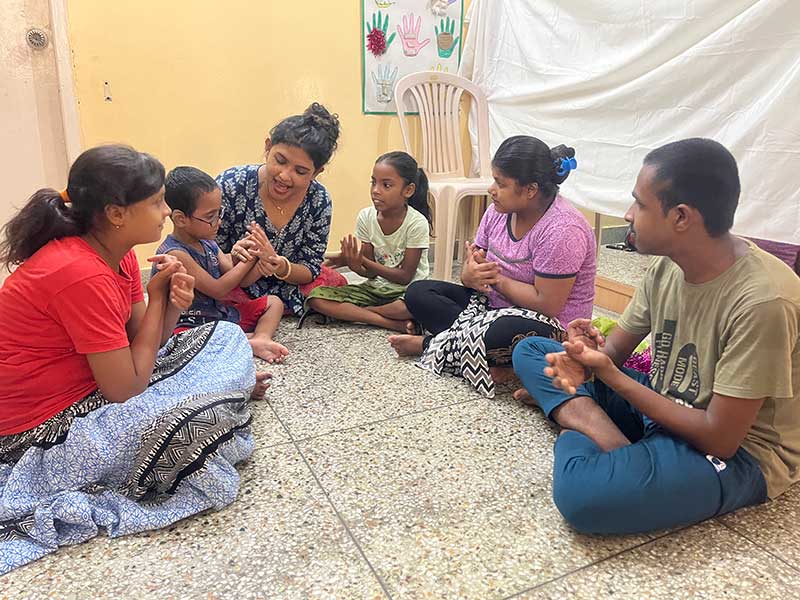
Overview
HOPE’s Brian’s Way Resource Centres aims to create an accessible space for children with special needs. Need-based therapy support and functional development skill sessions ensure that children grow to their fullest potential.
Currently, HOPE supports 3 Brian’s Way Resource Centres: South (Lake Gardens), Bhagar, and North (Chitpur)
Brian’s Way (South) and Brian’s Way (Bhagar) also operate a disability-friendly bus service and a toto service respectively. Both these facilities aim to make commuting to the centres accessible.
Additionally, through the parents support groups caregivers are empowered to care for their children better.
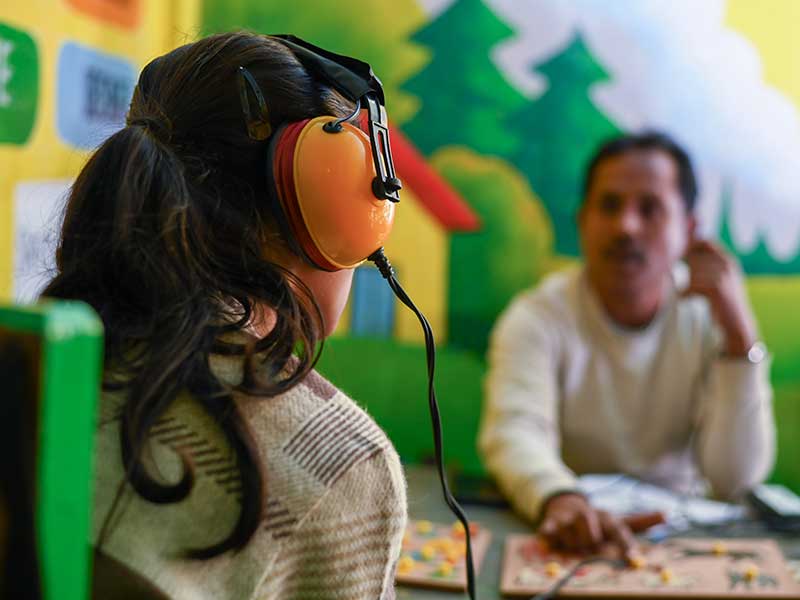
Story of Change
Ishu, a 5-year-old girl child, has a severe level of cerebral palsy. She belongs to a marginalised family. Her father is the only earning member of the family. Ishu’s mother is a homemaker.
When Ishu was six months old, doctors noticed delayed development and other symptoms which they later diagnosed as severe cerebral palsy. The doctors then suggested immediate physiotherapy and speech therapy for the child. Since the family struggled financially they could not afford private healthcare for the child. Thus, they went to a government hospital for the therapy. However, Ishu struggled to make any noticeable improvement here.
When Ishu’s parents attended an awareness programme organised by Hope Kolkata Foundation, they got to know about Brian’s Way Resource Centre. They immediately enrolled Ishu at Brian’s Way (North). Here, Ishu was thoroughly assessed. Accordingly, she attended physiotherapy and speech therapy.
Gradually, with intensive and continuous support from Brian’s Way, within a span of ten months Ishu improved significantly. Her parents were overjoyed to see the progress their daughter had made. They now express their heartfelt relief and gratitude.
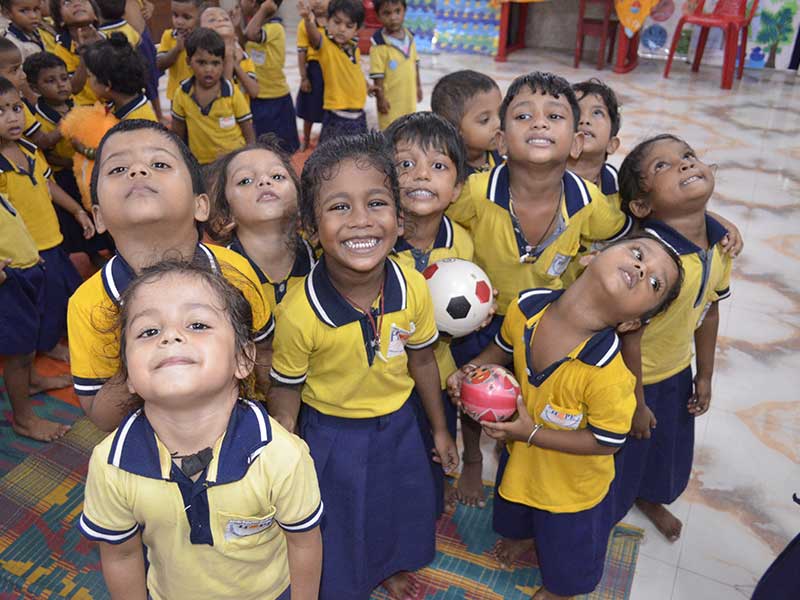
Overview
HOPE extends creche facilities for children aged between 2 to 5 years. Parents living in street and slum connected communities, or those incarcerated avail this facility to provide children with a safe stay during their absence.
Early childhood education and development are chief aims of this project. Complementary nutrition support, healthcare support, and healthcare support ensure that children receive the best care possible.
Parents’ awareness programmes also aim to improve and inform best child-rearing practices.
Currently, HOPE runs 5 creches in Kolkata and Bhagar.
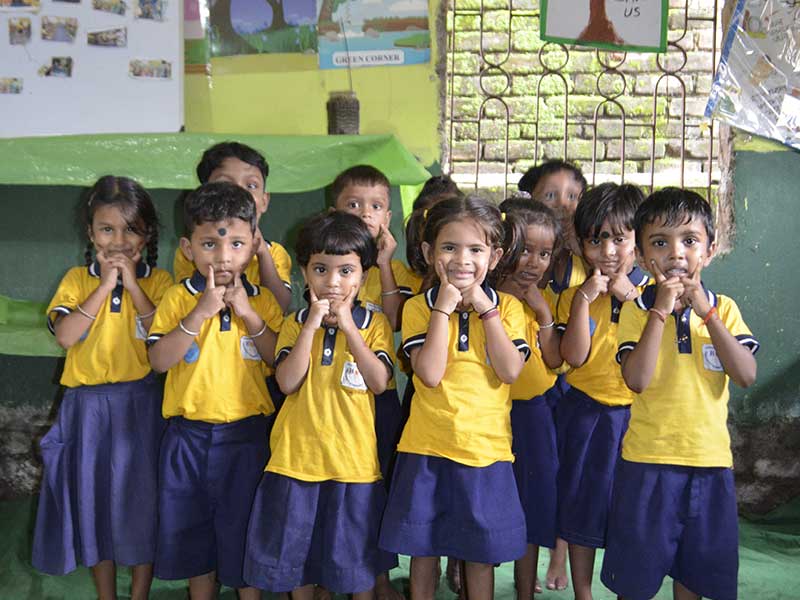
Story of Change
Raghav is a 4-year old boy who lives with his family in a rented place near Bhagar, a dumping area. The small boy has always been excited to come to the creche.
However, soon Raghav started exhibiting hostile behaviour towards his other friends and classmates. Teachers promptly intervened. Using positive reinforcement techniques, storytelling activities and role-play, the teachers encouraged Raghav to modify his behaviour.
Very soon Raghav took to these new activities. Gradually, his behaviour improved, and he interacted very well with all his friends and teachers. Now, Raghav is the class monitor. He is a happy, proud, independent and obedient child.
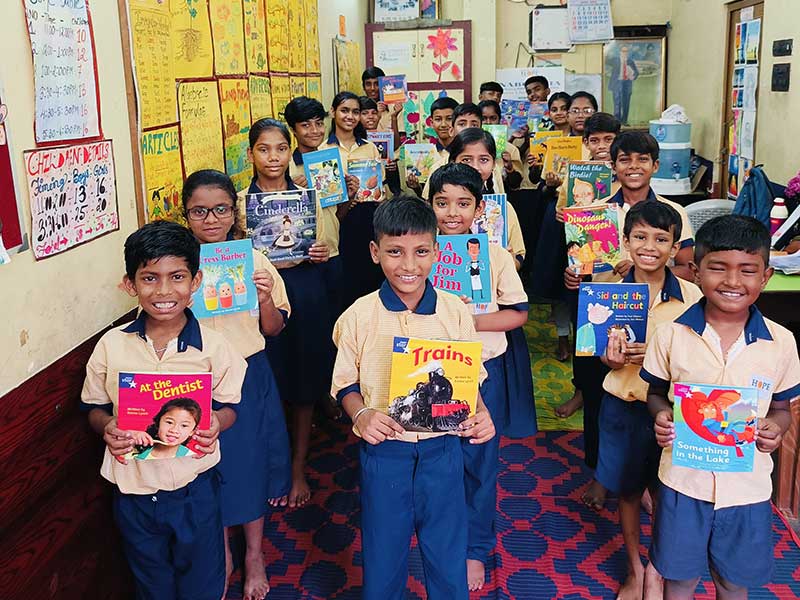
Overview
Naboasha aims to make education accessible to all street and slum-connected children aged 6 to 14 years of age. Coaching classes, extra-curricular activities, and counselling support ensure the overall development of children.
This project also strives to ensure the school enrollment and retention of children in formal schools. Additionally, the communities are strengthened through awareness programmes to support the holistic development of all children. Community Support Groups and Child Vigilance Groups are two community volunteer groups promoted and strengthened to create sustainable protection nets within the community.
Currently, there are 8 Naboasha centres in Kolkata:
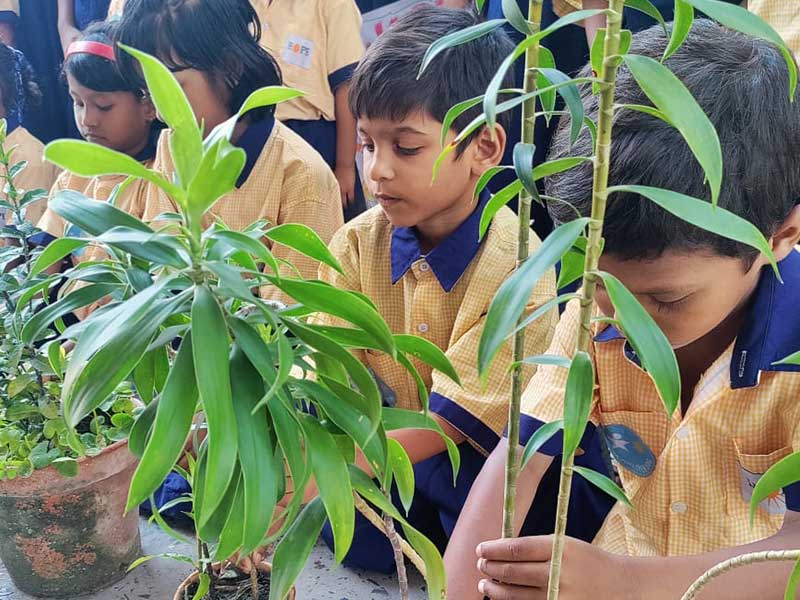
Story of Change
Rikta, a 13-year-old girl, lived in a small rented room in Park Circus with her parents, elder brother, and sister. Her father, a daily laborer, struggled with alcoholism, leading to frequent abuse, while her mother worked as a house help to support the family. Due to financial difficulties and her father’s abusive behavior, Rikta lost interest in school and eventually dropped out, struggling with emotional trauma.
Rikta was identified by the Child Vigilance Group (CVG) of the Naboasha Topsia center five years ago. Despite her parents' initial reluctance, Naboasha teachers and CVG members visited her home repeatedly, counseling them about the importance of education. Rikta’s father, who was initially hesitant, eventually agreed to send her to the center. Alongside, Rikta also received regular counselling.
With the support of the Naboasha teachers, she slowly regained her confidence and began to show interest in studying. Recognising her talents in art and craft, teachers encouraged her to pursue creative activities. Soon, she was admitted to Adi Ballygunge Vidyalaya.
Rikta is now in class VII. She excels in both academics and extracurricular activities. Her journey from a dropout to a thriving student is truly inspiring.
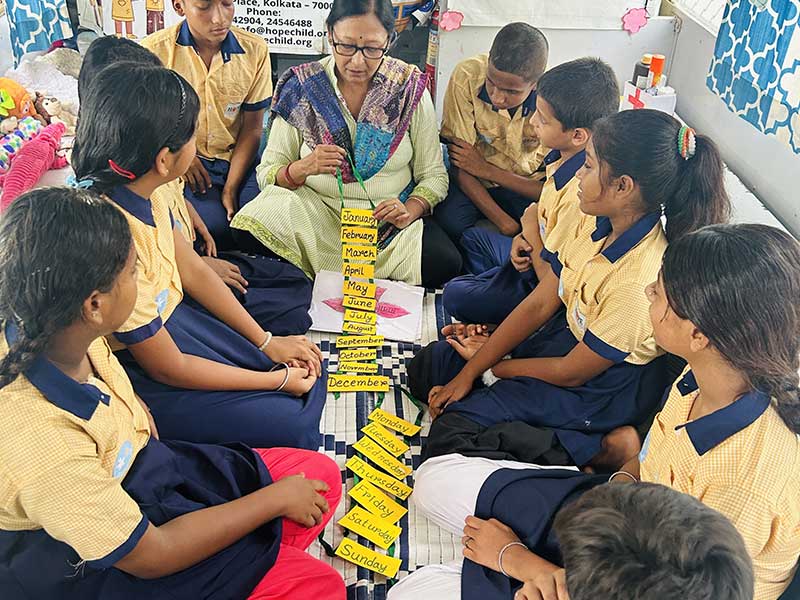
Overview
The Education On Wheels supports the educational needs of children living in Chitpur. Operating on a bus powered by solar panels, Education on Wheels also extends counselling and art therapy support.
Generating awareness, ensuring school enrollment and retention are some of the key aspects of this project.
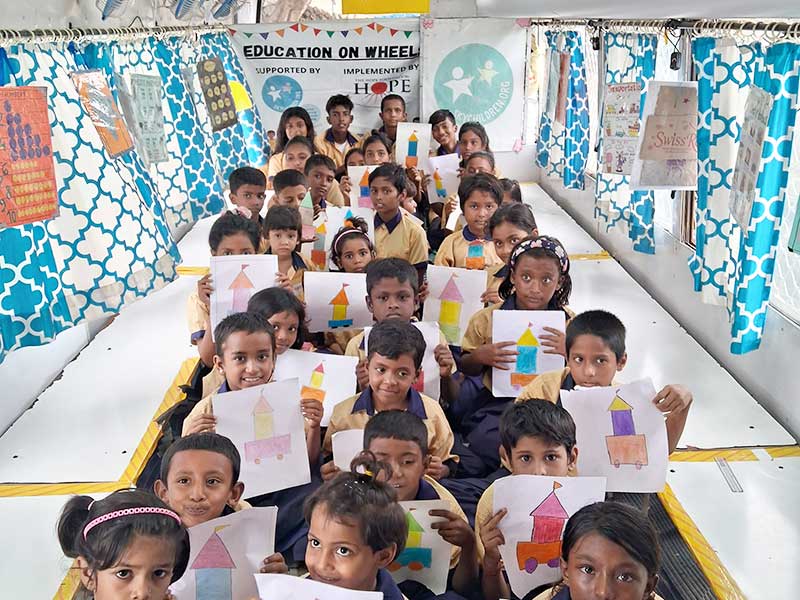
Story of Change
Debjit Singh (name changed), a 10-year-old boy from a slum in Chitpur, faced immense challenges due to his father’s alcoholism and violence. His family's dire financial situation led him to drop out of school to help with chores.
Very soon, the teachers from Education on Wheels identified Debjit and intervened by counselling both him and his parents. Individual therapy sessions using mindfulness, art therapy, helped him manage anger and regain focus. His mother was motivated to prioritise his education, and his father was encouraged to reduce his addiction.
Initially struggling to adjust, Debjit slowly gained confidence. His interest in studies returned, and he was re-enrolled in class III at Gun & Shell Factory High School. Now in class IV, Debjit is attentive in school, confident, and excelling in academics. He participates actively in extracurricular activities, particularly art and craft. His academic performance and social skills have vastly improved, and he is now a regular student with clear aspirations for a brighter future.
Overview
In collaboration with Girl2B, HOPE works to ensure the equal education of young girls up to 18 years of age. Regular coaching sessions, extra-curricular classes, and opportunities for livelihood skills are extended to empower these young students.
Counselling support also ensures that the young girls receive all-round help and are equipped to become independent agents of change.
Story of Change
Riya Kumari, a 14-year-old girl, lives with her grandmother and maternal uncle. Her grandmother works as a maid, and her uncle is a daily laborer. Riya is currently studying in class VII at Bal Hindi Vidhyalaya. Upon enrolling in the Education Support Unit (ESU), Riya was notably hesitant to engage with others. Recognizing Riya's potential and the barriers she faced, the teachers initiated a series of motivational and encouraging activities designed to build her confidence and social skills. Over time, Riya responded positively to the intervention. She gradually became more friendly and open, establishing good communication and relationships with her teachers and peers. Riya began participating actively in all the programs and activities conducted at the center. She continues to maintain her positive relationships within the ESU and excels in her academic and extracurricular pursuits. Riya's journey highlights the impact of a supportive educational environment on a child's social and academic development.
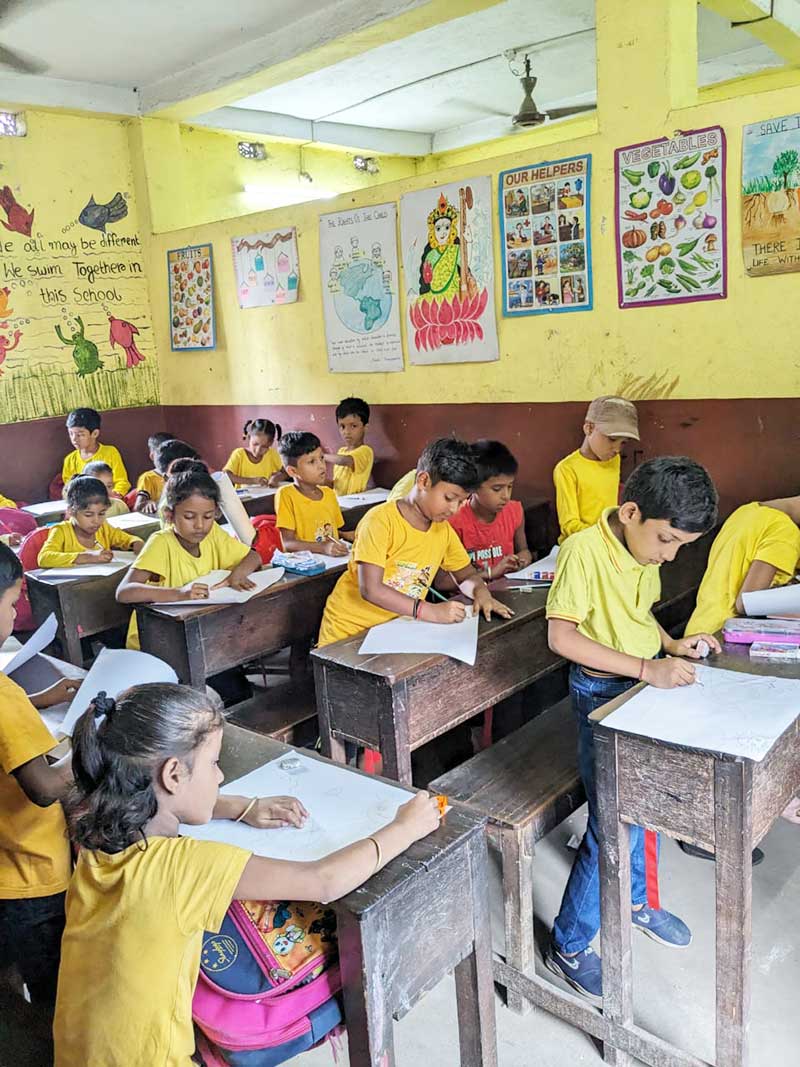
Overview
HOPE’s Sponsorship program supports children and young adults from vulnerable communities, providing education, nutrition, and emergency medical care for their holistic development.
The program offers counseling for parents on budgeting, family strengthening, and connecting with government services. It also runs remedial coaching centers in Bhagar and Chitpur, along with outreach programs in Sundarban, Khiderpore, and Sundarbans.
Through tuition support, extracurricular activities, and awareness initiatives, the program promotes the growth of both children and their communities.
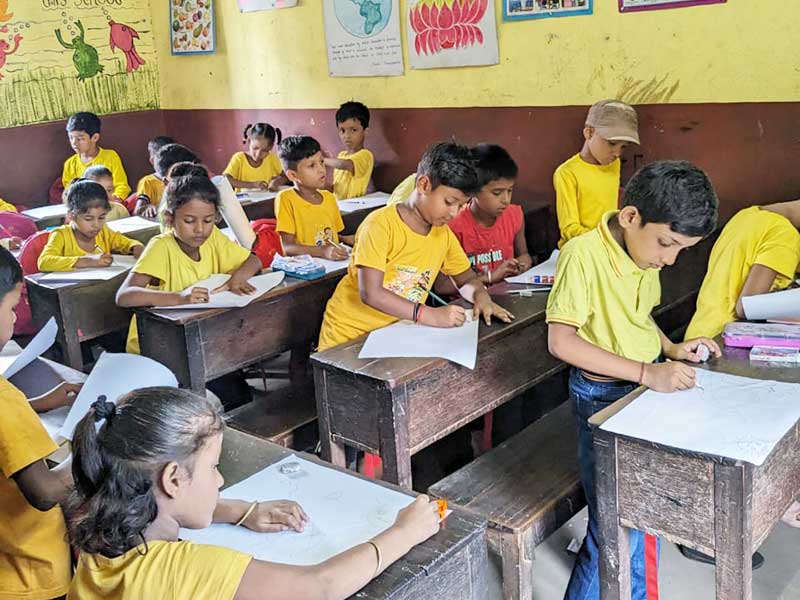
Story of Change
Meghna, now 23 years old, tragically lost her parents at a very young age. Unable to care for her or her younger brother, her immediate family felt helpless. They contacted the Child Welfare Committee for assistance, and Meghna was placed in a residential child care centre for proper care and protection.
In 2013, Meghna was restored home, and she was supported through the Sponsorship Programme, which played a pivotal role in her education. The programme sponsored Meghna's monthly school fees, private tuition fees, and yearly school admission fee. School supplies, stationary items, and emergency medical support made a significant difference to Meghna's academic and personal journey. The monthly nutrition assistance also helped Meghna and her family access indispensable basic needs.
With the financial barriers now lifted, Meghna devoted herself to her academic aspirations. After finishing school, she pursued a BA (Bachelor of Arts) in Education and graduated with a commendable CGPA.
Meghna's consistent dedication and hard work secured her a job at the State Bank of India. Meghna is now a successful young girl who has complete financial autonomy.
If you want to contribute towards making a difference to the lives of vulnerable children, please click here.